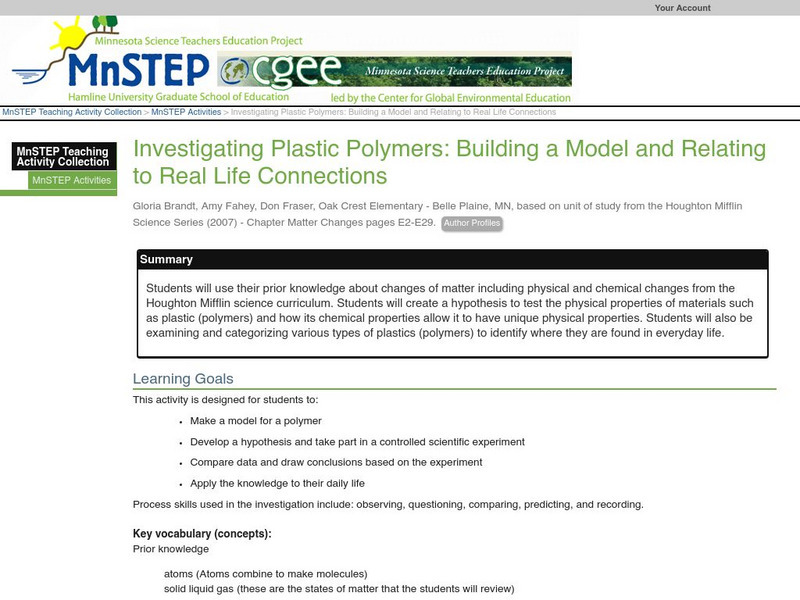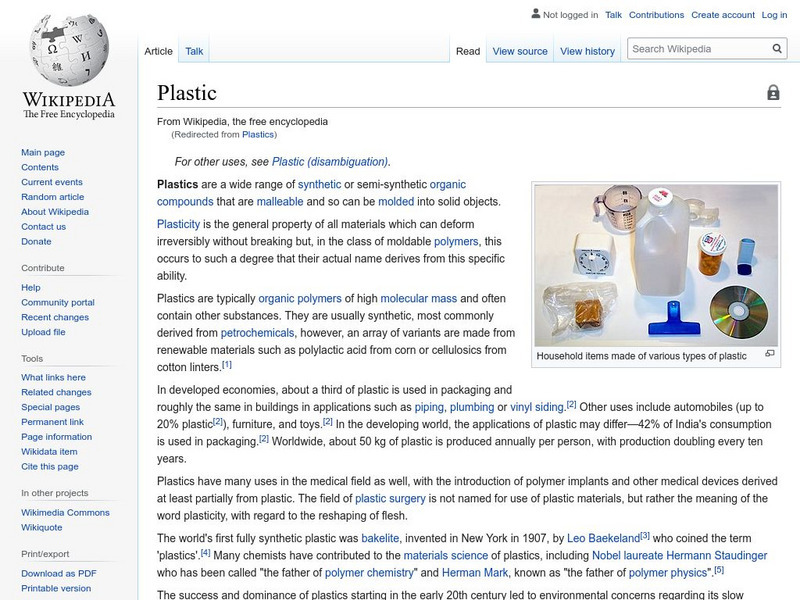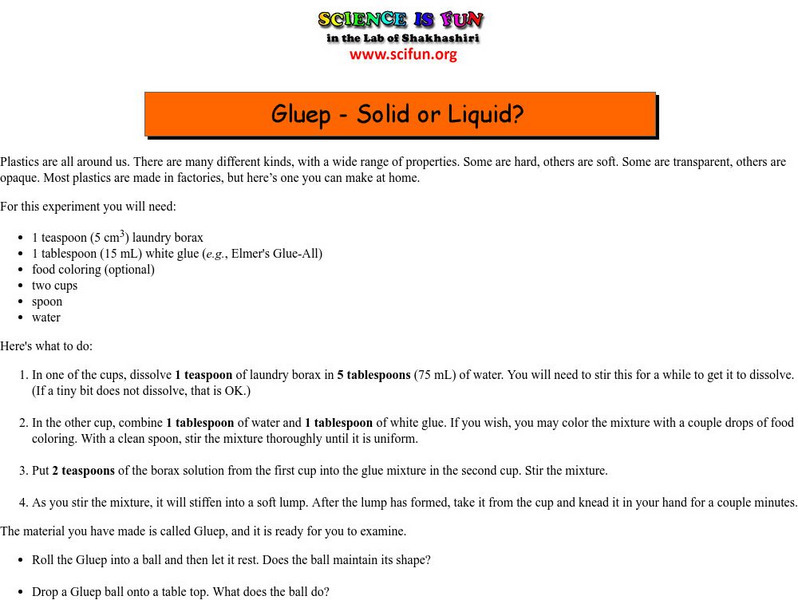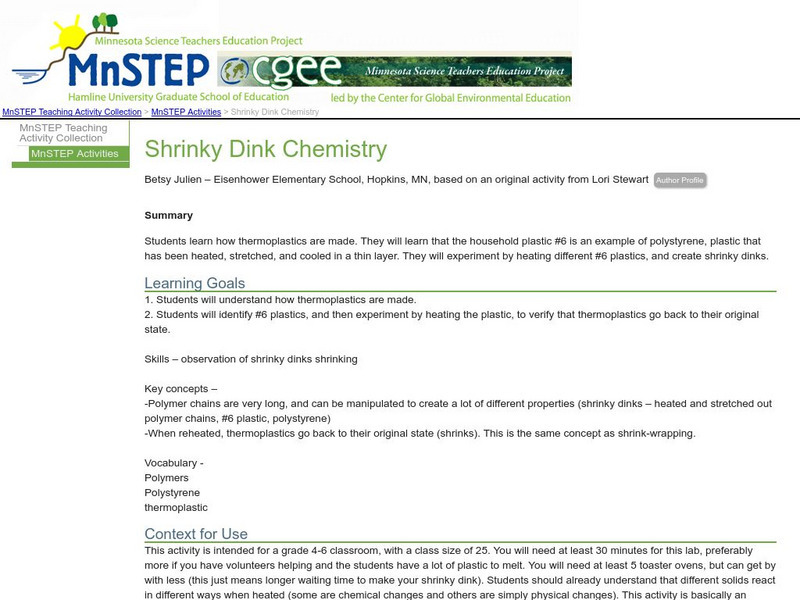Concord Consortium
Concord Consortium: Stem Resources: Plastic Forces
This simple interactive tool lets students explore what happens to the long molecular chains in a plastic polymer material when forces of varying intensity are exerted on it.
Science Education Resource Center at Carleton College
Serc: Investigating Plastic Polymers: Building a Model
Students will use their prior knowledge about changes of matter including physical and chemical changes from the Houghton Mifflin science curriculum. Students will create a hypothesis to test the physical properties of materials such as...
TeachEngineering
Teach Engineering: Close Encounters of the Polymer Kind
Students explore the basic characteristics of polymers through the introduction of two polymer categories: thermoplastics and thermosets.
Wikimedia
Wikipedia: Plastic
Wikipedia offers all of the basic information one would need about the topic of plastic. Includes hyperlinked table of contents for easy site navigation.
Maryland Science Center
Maryland Science Center: Milk Plastic [Pdf]
A simple experiment to create a chemical reaction between milk and vinegar, with the product being a type of plastic.
Science Education Resource Center at Carleton College
Serc: Mn Step: Where in the World Can I Find Plastic Polymers. Why Are They Used?
An investigation of where plastic polymers can be found in everyday life. After identifying them, students test them to learn about their properties, then try some online activities.
Science Education Resource Center at Carleton College
Serc: Polymers & Plastics: Classification & Models
Young scholars will use their prior knowledge about changes of matter including physical and chemical changes to examine and categorize various types of plastics (polymers). They will identify how their chemical properties allow them to...
TeachEngineering
Teach Engineering: Bridging to Polymers: Thermoset Lab
Students act as engineers to learn about the strengths of various epoxy-amine mixtures, and observe the unique characteristics of different mixtures of epoxies and hardeners. Student groups make and optimize thermosets by combining two...
Science Education Resource Center at Carleton College
Serc: Plastic Polymers: Investigating Their Flexibility
Young scholars will use their prior knowledge about changes of matter to develop a hypothesis to test the physical properties of materials such as plastic (polymers) and how its chemical properties allow it to have unique physical...
Math Science Nucleus
Math/science Nucleus: Polymer Storybook
This animation discusses polymers and the properties of polymers in a storybook format. The story covers polymers both plastic and natural, and provides interesting information.
Other
American Plastics Council: The History of Plastics
This site from the American Plastics Council provides a brief history of all major developments of fibers and plastics including the early invention of rayon. Very interesting and informative, it also includes a timeline for easier...
McREL International
Mc Rel: Glue Polymer (Whelmer #15 Learning Activity)
An easy to do activity that investigates the basic principles behind chemical bonding. The activity is written in lesson plan format that meets NSES standards.
Science is Fun
Science Is Fun: Gluep Solid or Liquid?
In this experiment, students create a polymer substance called Gluep, then investigate its properties. Includes a detailed explanation of how the polymer molecules bond together to form the plastic.
Science Education Resource Center at Carleton College
Serc: Mn Step: Shrinky Dink Chemistry
In this lesson, students first learn about thermoplastics, and about polystyrene in particular, which is a #6 plastic. They will then heat different #6 plastics to create shrinky dinks. As they are heated, they shrink, which is a...
Other
Libros Vivos: Los Plasticos
Plastics are obtained by polymerization of compounds derived from petroleum and natural gas. Learn about the different plastics and about the different process of fabrication in this site. You will find a lot of illustrations and...
Other
San Diego Plastics, Inc.: Polyethylene
The features, applications, and the fabrication process of high density and low density polyethylenes are listed and described.
York University
Chemistry Hall of Fame: Polyethylene a Plastic of Many Uses
Background information on the discovery of polyethylene is found on this website. Also lists polyethylene's many uses.
Other
Prince Edward Island: Behind the Eight Ball
Interesting historical article about the driving force behind the invention of celluloid.
Wikimedia
Wikipedia: Polypropylene
This site from Wikipedia, the free encyclopedia, provides brief but factual information on the function of Polypropylene. A good site to get a short overview on the subject, with a few links to additional information.
Curated OER
Smithsonian Institution Archives: Jeanne Helen Osiecki (B. 1926)
A native of Switzerland, organic chemist Jeanne Helen Osiecki (b. 1926) had received her Ph.D. from Stanford University in 1960 and began working at Lockheed Missiles and Space Co. in 1961. When this photograph was distributed, Osiecki...




![Maryland Science Center: Milk Plastic [Pdf] Activity Maryland Science Center: Milk Plastic [Pdf] Activity](https://static.lp.lexp.cloud/images/attachment_defaults/resource/large/FPO-knovation.png)












